 Petzlover
Petzlover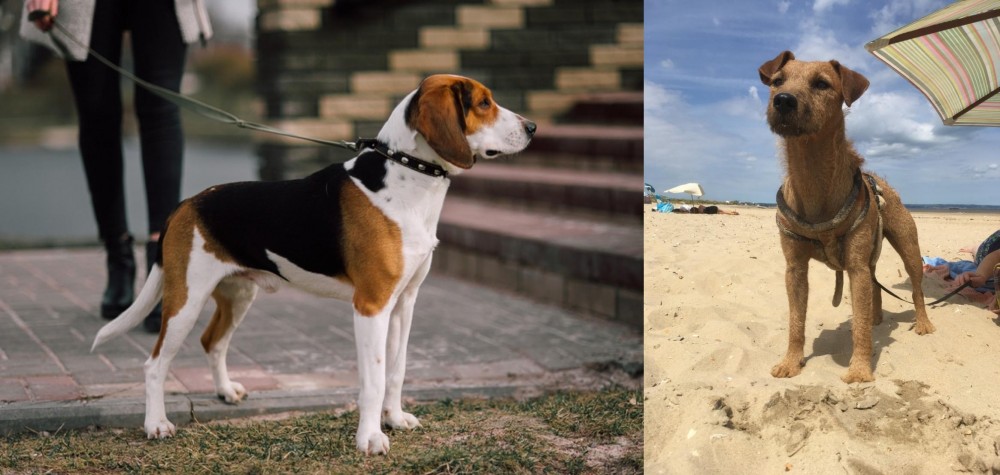 Estonian Hound is originated from Estonia but Fell Terrier is originated from United Kingdom. Estonian Hound may grow 14 cm / 6 inches higher than Fell Terrier. Estonian Hound may weigh 11 kg / 25 pounds more than Fell Terrier. Both Estonian Hound and Fell Terrier has almost same life span. Both Estonian Hound and Fell Terrier has almost same litter size. Both Estonian Hound and Fell Terrier requires Moderate Maintenance.
Estonian Hound is originated from Estonia but Fell Terrier is originated from United Kingdom. Estonian Hound may grow 14 cm / 6 inches higher than Fell Terrier. Estonian Hound may weigh 11 kg / 25 pounds more than Fell Terrier. Both Estonian Hound and Fell Terrier has almost same life span. Both Estonian Hound and Fell Terrier has almost same litter size. Both Estonian Hound and Fell Terrier requires Moderate Maintenance.
 In 1947, the Estonian Hound was developed and remains today the only pure breed ever developed in Estonia. At that time the national economic minister of the Soviet Union declared that every country in the USSR must have a national dog breed. Thus, the Estonian Hound and the Estonian Kennel Union were born. The Kennel Union is currently seeking breed recognition from the Federation Cynoloqique Internationale.
In 1947, the Estonian Hound was developed and remains today the only pure breed ever developed in Estonia. At that time the national economic minister of the Soviet Union declared that every country in the USSR must have a national dog breed. Thus, the Estonian Hound and the Estonian Kennel Union were born. The Kennel Union is currently seeking breed recognition from the Federation Cynoloqique Internationale.
The Estonian Hound came from breeding local Estonian hunting dogs with several different breeds of foreign dogs. The Soviet decree also established that hunting dogs had to be no more than 17 inches high. This result in a hunting dog with great agility and drive that is extremely popular in now inependent Estonia. It is the national dog.
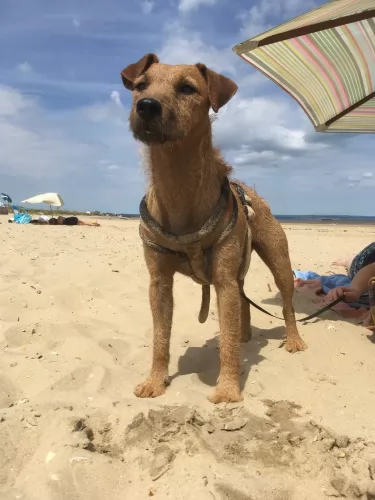 Fell terriers, known by other names such as Lakeland-, Patterdale-, Red Fell or Black Fell Terrier are small working terriers, hailing from the fell or hilly country of northern England.
Fell terriers, known by other names such as Lakeland-, Patterdale-, Red Fell or Black Fell Terrier are small working terriers, hailing from the fell or hilly country of northern England.
Several breeds have been developed from the Fell terrier, of which the Patterdale Terrier, Lakeland are some as well as other locally developed breeds. All these particular breeds are sometimes referred to as the Fell Terrier, and in fact the National Terriers Club LLC has published a Fell Terrier standard.
It is also believed that the long legged Fell Terriers may have descended from an old type of terrier referred to as the rough-coated Black and Tan. The Black and Tan Terrier is now extinct but was drawn into The Kennel Club as the Welsh Terrier.
 The Estonian Hound is a strong, muscular body of medium size, with well-developed muscles and strong bones. It has a straight muzzle and skull with defined eyebrows and long drop ears. They have black noses and dark eyes. Their back is wide and straight, and their chest is deep and wide. They have skin that is tight with no wrinkles or folds anywhere.
The Estonian Hound is a strong, muscular body of medium size, with well-developed muscles and strong bones. It has a straight muzzle and skull with defined eyebrows and long drop ears. They have black noses and dark eyes. Their back is wide and straight, and their chest is deep and wide. They have skin that is tight with no wrinkles or folds anywhere.
The Estonian Hound is double coated, but the undercoat is not well developed. The top coat is rough, short and shiny. The tail has a thick covering of hair. The color is usually white with red patches, black or brown patches or yellow patches.
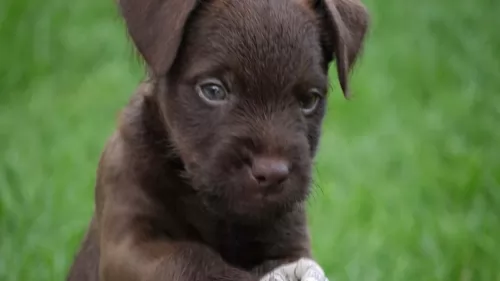 Small and feisty, the Fell Terrier is a working dog used for hunting purposes. He stands at roughly 31cm to 38cm in height and ways between 6 to 9kg.
Small and feisty, the Fell Terrier is a working dog used for hunting purposes. He stands at roughly 31cm to 38cm in height and ways between 6 to 9kg.
The dogs were sought after for their hunting skills as being the small dog they were, and with their narrow chests, they were able to move around in small, narrow underground tunnels.
The Fell has long legs, and his coat is shortish but with a rough texture to it. The coat is found in different colors such as white, black and tan, chocolate, red, black and bronze. The ears are medium length and floppy while the tail of the dog is traditionally docked, but these days the tail is often left long, and then he becomes less distinctive.
Used to having hunted in packs, the Fell Terrier has always been used to getting along well with other dogs. He makes a fantastic family pet and will get on well with children who have been been taught to respect animals. He is an independent, strong-willed dog and will certainly need socialization and training to turn him into an obedient dog.
He is energetic, fearless, strong-willed, determined and always ready for a game or some form of action.
 The Estonian Hound is a happy dog and loves to play with children. He was bred to hunt though and he can get fixated on a scent and knock over a small child.
The Estonian Hound is a happy dog and loves to play with children. He was bred to hunt though and he can get fixated on a scent and knock over a small child.
He is a hunting dog with great agility and drive.
He has had to be adaptable through his short history and is now more a companion than a hunting dog. He can live in the city or country.
He is intelligent and trainable. He is lively and energetic and the challenge might be keeping his attention long enough to train.
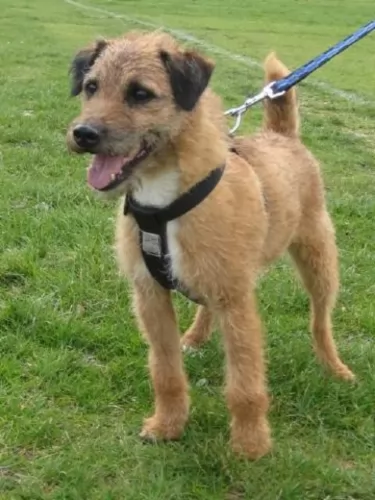 The Fell Terrier still has dreams of the hunt in him and with his strong prey instincts, he isn’t really suited to city living, but will fit ideally into life in the country.
The Fell Terrier still has dreams of the hunt in him and with his strong prey instincts, he isn’t really suited to city living, but will fit ideally into life in the country.
He is a high spirited, working dog with an endless amount of energy. He bonds closely with his human family, and for all his robust, larger-than-life attitude and boldness, when he is with his human family he can be gentle, calm and loving, just thriving on the love he receives.
Your Fell Terrier is just waiting to be your best friend and a never ending source of unconditional love.
 With such a young breed there have not been any studies done on their health or genetic issues. It seems the breed is fairly healthy but there is too little information to really say. Being confined to Estonia there has been little commercial or backyard breeding. He is less likely than most pure breeds to have genetic issues.
With such a young breed there have not been any studies done on their health or genetic issues. It seems the breed is fairly healthy but there is too little information to really say. Being confined to Estonia there has been little commercial or backyard breeding. He is less likely than most pure breeds to have genetic issues.
It is likely that dogs of his type are at risk for:
Caused by excessive exercise before or after having eaten a large meal. It is suggested that you feed your English Setter twice a day, smaller meals and not right before or after strenuous exercise.
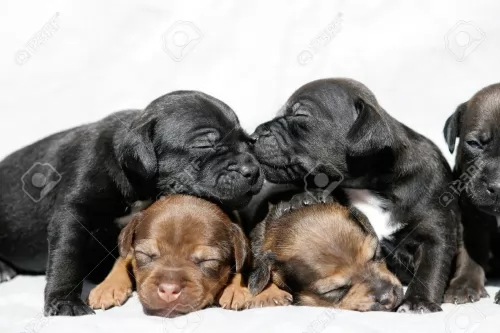 Caring for your Fell Terrier requires knowing what do do with him when he develops certain common dog illnesses. He is a robust dog and is not likely to get any serious illnesses, but still you want to know about some of the more common ones.
Caring for your Fell Terrier requires knowing what do do with him when he develops certain common dog illnesses. He is a robust dog and is not likely to get any serious illnesses, but still you want to know about some of the more common ones.
If you suspect an illness, get your pet to the vet who can provide you with a treatment plan for your dog.
Your Fell Terrier can easily fall prey to dental disease if you don't brush his teeth at least 2 or 3 times a week. Unfortunately bad teeth isn't just a case of losing a tooth or two, bad teeth can cause serious diseases such as kidney disease. Tarter build-up progresses to infection of the gums as well as roots of the teeth. So serious is dental disease that your dog can actually have his life shortened.
Your Fell Terrier is a small dog and obesity can easily creep up if you don't control your pet's diet. Obesity is a serious illness that can increase problems with the joints and digestion.
 Feed a high quality dry food made for puppies. Feed ¼ to ½ cup per day in 2-3 meals for the first six months.
Feed a high quality dry food made for puppies. Feed ¼ to ½ cup per day in 2-3 meals for the first six months.
Feed 1 to 2 cups in two meals from 6 months to a year or so.
Feed about 2 to 3 cups in two meals.
As previously mentioned this seems to be a fairly healthy breed.
Be careful not to feed a large meal before or after exercise due to possibility of bloat.
Check their ears and clean them periodically.
The Estonian Hound is a hunting dog and needs a good deal of exercise – at least an hour and a half every day or a long walk if not used for hunting. He is a working dog with a lot of energy and stamina. Don’t let him off leash though or he will follow his nose and take off. He is usually calm and quiet indoors if he gets enough physical and mental stimulation outdoors. He can be destructive and loud, nervous and hyper if he doesn’t. They enjoy Frisbee, agility, tracking and of course hunting.
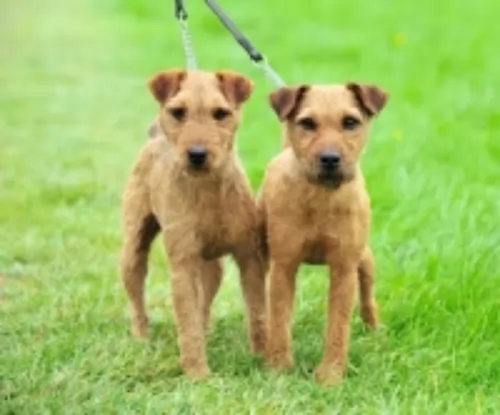 Your Fell Terrier is an active dog who won’t thrive if he is cooped up and ignored. He thrives on action and will need to be taken on walks with you and involved in all your games and sports, such as when you go jogging, swimming or cycling.
Your Fell Terrier is an active dog who won’t thrive if he is cooped up and ignored. He thrives on action and will need to be taken on walks with you and involved in all your games and sports, such as when you go jogging, swimming or cycling.
Feed your Fell Terrier the best quality commercially manufactured foods if you opt to feed your pet this way. Include cooked brown rice, vegetables and chicken into his kibble from time to time and always ensure there is cool, fresh drinking water available to him.
It depends on whether your Fell Terrier has a short, smooth coat, or the longer-haired coarse coat. He will certainly need brushing twice a week and sometimes, with the longer coats, he may require professional trimming or stripping.
Always check nails, in and outside the ears and remember to brush his teeth with canine toothpaste and toothbrush twice a week at least.